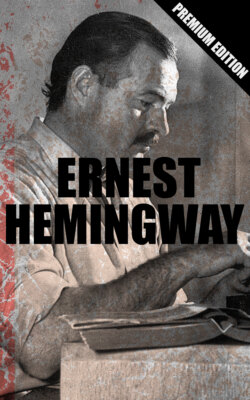Читать книгу ERNEST HEMINGWAY - Premium Edition - Ernest Hemingway - Страница 14
На сайте Литреса книга снята с продажи.
CHAPTER SEVEN
ОглавлениеTable of Contents
That night, after his first day in the pump-factory, the first day in what was or were to become an endless succession of days of dull piston-collaring, Scripps went again to the beanery to eat. All day he had kept his bird concealed. Something told him that the pump-factory was not the place to bring his bird out in. During the day the bird had several times made him uncomfortable, but he had adjusted his clothes to it and even cut a little slit the bird could poke his beak out through in search of fresh air. Now the day’s work was over. It was finished. Scripps on his way to the beanery. Scripps happy that he was working with his hands. Scripps thinking of the old pump-makers. Scripps going to the society of the friendly waitress. Who was that waitress, anyway? What was it had happened to her in Paris? He must find out more about this Paris. Yogi Johnson had been there. He would quiz Yogi. Get him to talk. Draw him out. Make him tell what he knew. He knew a trick or two about that.
Watching the sunset out over the Petoskey Harbor, the lake now frozen and great blocks of ice jutting up over the breakwater, Scripps strode down the streets of Petoskey to the beanery. He would have liked to ask Yogi Johnson to eat with him, but he didn’t dare. Not yet. That would come later. All in good time. No need to rush matters with a man like Yogi. Who was Yogi, anyway? Had he really been in the war? What had the war meant to him? Was he really the first man to enlist from Cadillac? Where was Cadillac, anyway? Time would tell.
Scripps O’Neil opened the door and went into the beanery. The elderly waitress got up from the chair where she had been reading the overseas edition of The Manchester Guardian, and put the paper and her steel-rimmed spectacles on top of the cash register.
“Good evening,” she said simply. “It’s good to have you back.”
Something stirred inside Scripps O’Neil. A feeling that he could not define came within him.
“I’ve been working all day long”—he looked at the elderly waitress—“for you,” he added.
“How lovely!” she said. And then smiled shyly. “And I have been working all day long—for you.”
Tears came into Scripps’s eyes. Something stirred inside him again. He reached forward to take the elderly waitress’s hand, and with quiet dignity she laid it within his own. “You are my woman,” he said. Tears came into her eyes, too.
“You are my man,” she said.
“Once again I say: you are my woman.” Scripps pronounced the words solemnly. Something had broken inside him again. He felt he could not keep from crying.
“Let this be our wedding ceremony,” the elderly waitress said. Scripps pressed her hand. “You are my woman,” he said simply.
“You are my man and more than my man.” She looked into his eyes. “You are all of America to me.”
“Let us go,” Scripps said.
“Have you your bird?” asked the waitress, laying aside her apron and folding the copy of The Manchester Guardian Weekly. “I’ll bring The Guardian, if you don’t mind,” she said, wrapping the paper in her apron. “It’s a new paper and I’ve not read it yet.”
“I’m very fond of The Guardian,” Scripps said. “My family have taken it ever since I can remember. My father was a great admirer of Gladstone.”
“My father went to Eton with Gladstone,” the elderly waitress said. “And now I am ready.”
She had donned a coat and stood ready, her apron, her steel-rimmed spectacles in their worn black morocco case, her copy of The Manchester Guardian held in her hand.
“Have you no hat?” asked Scripps.
“No.”
“Then I will buy you one,” Scripps said tenderly.
“It will be your wedding gift,” the elderly waitress said. Again there were tears shone in her eyes.
“And now let us go,” Scripps said.
The elderly waitress came out from behind the counter, and together, hand in hand, they strode out into the night.
Inside the beanery the black cook pushed up the wicket and looked through from the kitchen. “Dey’ve gone off,” he chuckled. “Gone off into de night. Well, well, well.” He closed the wicket softly. Even he was a little impressed.
